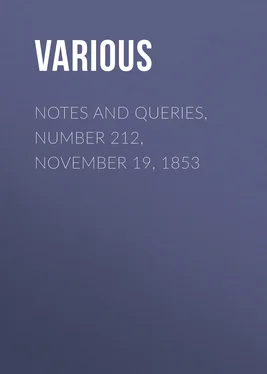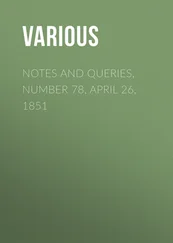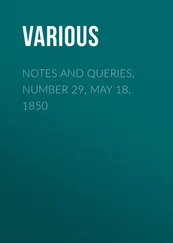Various - Notes and Queries, Number 212, November 19, 1853
Здесь есть возможность читать онлайн «Various - Notes and Queries, Number 212, November 19, 1853» — ознакомительный отрывок электронной книги совершенно бесплатно, а после прочтения отрывка купить полную версию. В некоторых случаях можно слушать аудио, скачать через торрент в формате fb2 и присутствует краткое содержание. Жанр: foreign_antique, periodic, foreign_edu, на английском языке. Описание произведения, (предисловие) а так же отзывы посетителей доступны на портале библиотеки ЛибКат.
- Название:Notes and Queries, Number 212, November 19, 1853
- Автор:
- Жанр:
- Год:неизвестен
- ISBN:нет данных
- Рейтинг книги:4 / 5. Голосов: 1
-
Избранное:Добавить в избранное
- Отзывы:
-
Ваша оценка:
- 80
- 1
- 2
- 3
- 4
- 5
Notes and Queries, Number 212, November 19, 1853: краткое содержание, описание и аннотация
Предлагаем к чтению аннотацию, описание, краткое содержание или предисловие (зависит от того, что написал сам автор книги «Notes and Queries, Number 212, November 19, 1853»). Если вы не нашли необходимую информацию о книге — напишите в комментариях, мы постараемся отыскать её.
Notes and Queries, Number 212, November 19, 1853 — читать онлайн ознакомительный отрывок
Ниже представлен текст книги, разбитый по страницам. Система сохранения места последней прочитанной страницы, позволяет с удобством читать онлайн бесплатно книгу «Notes and Queries, Number 212, November 19, 1853», без необходимости каждый раз заново искать на чём Вы остановились. Поставьте закладку, и сможете в любой момент перейти на страницу, на которой закончили чтение.
Интервал:
Закладка:
Various
Notes and Queries, Number 212, November 19, 1853 / A Medium of Inter-communication for Literary Men, Artists, Antiquaries, Genealogists, etc
Notes
PARTY-SIMILES OF THE SEVENTEENTH CENTURY—NO. I. "FOXES AND FIREBRANDS." NO. II. "THE TROJAN HORSE."
With Englishmen, at least, the seventeenth was a century pre-eminent for quaint conceits and fantastic similes: the literature of that period, whether devotional, poetical, or polemical 1 1 Dr. Eachard, in his work on The Grounds and Occasions of the Contempt of the Clergy and Religion inquired into , London, 1712, after ably showing up the pedantry of some preachers, next attacks the "indiscreet and horrid Metaphor Mongers." "Another thing that brings great disrespect and mischief upon the clergy … is their packing their sermons so full of similitudes" (p. 41.). Eachard has a museum of curiosities in this line. The Puritan Pulpit , however, far outstrips even the incredible nonsense and irreverence which he adduces. Let any one curious in such matters dip into a collection of Scotch Sermons of the seventeenth century. Sir W. Scott, in some of his works, has endeavoured to give a faint idea of the extraordinary way in which passages of Holy Scripture were applied in the same century. I have a very curious book of soliloquies , which unfortunately wants the title-page. From internal evidence, however, it appeals to have been written in Ireland in the seventeenth century: the writer signs himself "P. P." The editor of this little 12mo., in "An Epistle to the Reader," after reprehending "the wits of our times" for "quibbling and drolling upon the Bible," says immediately after:—"This author's innocent abuse of Scripture is so far from countenancing, that it rather shames and condemns that licentious and abominable practice. Nor can we admit of the most useful allusions without that harmless (nay helpful and advantageous) καταχρησις, or abuse here practised: wherein the words are indeed used to another, but yet to a Holy end and purpose, besides that for which they were at first instituted and intended." The most reverend of our readers must need smile, were I to give a specimen of this "innocent abuse." While noticing the false wit which passed current in that century, we must not forget that the same age produced a South and a Butler: and that in beauty of simile, few, if any, surpass Bishop Jeremy Taylor.
, was alike infected with the universal mania for strained metaphors, and men vied with each other in giving extraordinary titles to books, and making the contents justify the title. Extravagance and the far-fetched were the gauge of wit: Donne, Herbert, and many a man of genius foundered on this rock, as well as Cowley, who acted up to his own definition:
"In a true Piece of Wit all things must be,
Yet all things there agree;
As in the Ark , join'd without force or strife,
All creatures dwelt—all creatures that had life."
It is not, however, for the purpose of illustrating this mania that I am about to dwell on the two similes which form the subject of my present Note: I selected them as favourite party-similes which formed a standing dish for old Anglican writers; and also because they throw light on the history of religious party in England, and thus form a suitable supplement to my article on "High Church and Low Church" (Vol. viii., p. 117.).
As the object of the Church of England, in separating from Rome, was the reformation , not the destruction of her former faith, by the very act of reformation she found herself opposed to two bodies; namely, that from which she separated, and the ultra-reformers or Puritans, who clamoured for a radical reformation.
Taking these as the Scylla and Charybdis—the two extremes to be avoided—the Anglican Church hoped to attain the safe and golden mean by steering between these opposites, and find, in this via media course, the path of truth.
Accordingly, her divines abound with warnings against the aforesaid Scylla and Charybdis, and with exhortations to cleave to the middle line of safety. Acting on the proverb that extremes meet , they were ever drawing parallels between their two opponents. On the other hand, the Puritans stoutly contended that they were the true middle-men; and in their turn traced divers similarities and parallels betwixt "Popery and Prelacy," the "Mass Book and Service Book." 2 2 An Analysis of the "divers pamphlets published against the Book of Common Prayer" would make a very curious volume. Take a passage from the Anatomy of the Service Book , for instance: "The cruellest of the American savages, called the Mohaukes, though they fattened their captive Christians to the slaughter, yet they eat them up at once; but the Service-book savages eat the servants of God by piece-meal: keeping them alive (if it may be called a life) ut sentiant se mori , that they may be the more sensible of their dying" (p. 56.). Sir Walter Scott quotes a curious tract in Woodstock , entitled Vindication of the Book of Common Prayer against the Contumelious Slanders of the Fanatic Party terming it "Porridge." The author of this singular and rare tract (says Sir W.) indulges in the allegorical style, till he fairly hunts down the allegory. The learned divine chases his metaphor at a very cold scent, through a pamphlet of his mortal quarto pages.—See a Parallel of the Liturgy with the Mass Book, Breviary, &c. , by Robert Baylie. 1661, 4to.
Without farther preface, I shall give the title of a curious work, which will tell its own story:
" Foxes and Firebrands ; or A Specimen of the Danger and Harmony of Popery and Separation . Wherein is proved from undeniable Matter of Fact and Reason, that Separation from the Church of England is, in the Judgment of Papists, and by Experience, found the most Compendious way to introduce Popery, and to ruine the Protestant Religion:
'Tantum Religio potuit suadere Malorum.'"
A work under this title was published, if I mistake not, in London in 1678 by Dr. Henry Nalson; in 1682, Robert Ware reprinted it with a second part of his own; and in 1689 he added a third and last part in 12mo., uniform with the previous volume. 3 3 [See "N. & Q.," Vol. viii., p. 172.—Ed.]
In the Epist. Ded. to Part II. the writer says of the Church of England:
"The Papists on the one hand, and the Puritans on the other, did endeavour to sully and bespatter the glory of her Reformation: the one taxing it with innovation, and the other with superstition."
The Preface to the Third Part declares that the object of the whole work is "to reclaim the most haggard Papists" and Puritans.
Wheatly, in treating of the State Service for the 29th of May, remarks:
"The Papists and Sectaries, like Sampson's Foxes, though they look contrary ways, do yet both join in carrying Fire to destroy us: their End is the same, though the method be different."— Rational Illust. of the Book of Common Prayer , 3rd edit., London, 1720, folio.
The following passage occurs in A Letter to the Author of the Vindication of the Clergy , by Dr. Eachard, London, 1705:
"I have put in hard, I'll assure you, in all companies, for two or three more: as for example, The Papist and the Puritan being tyed together like Sampson's Foxes . I liked it well enough, and have beseeched them to let it pass for a phansie; but I could never get the rogues in a good humour to do it: for they say that Sampson's foxes have been so very long and so very often tied together, that it is high time to part them. It may be because something very like it is to be found in a printed sermon, which was preached thirty-eight years ago: it is no flam nor whisker. It is the forty-third page upon the right hand. Yours go thus, viz. Papist and Puritan, like Sampson's Foxes, though looking and running two several ways, yet are ever joyned together the tail. My author has it thus, viz. The Separatists and the Romanists consequently to their otherwise most distant principles do fully agree, like Sampson's Foxes, tyed together by the tails, to set all on fire, although their faces look quite contrary ways. "—P. 34.
Читать дальшеИнтервал:
Закладка:
Похожие книги на «Notes and Queries, Number 212, November 19, 1853»
Представляем Вашему вниманию похожие книги на «Notes and Queries, Number 212, November 19, 1853» списком для выбора. Мы отобрали схожую по названию и смыслу литературу в надежде предоставить читателям больше вариантов отыскать новые, интересные, ещё непрочитанные произведения.
Обсуждение, отзывы о книге «Notes and Queries, Number 212, November 19, 1853» и просто собственные мнения читателей. Оставьте ваши комментарии, напишите, что Вы думаете о произведении, его смысле или главных героях. Укажите что конкретно понравилось, а что нет, и почему Вы так считаете.












